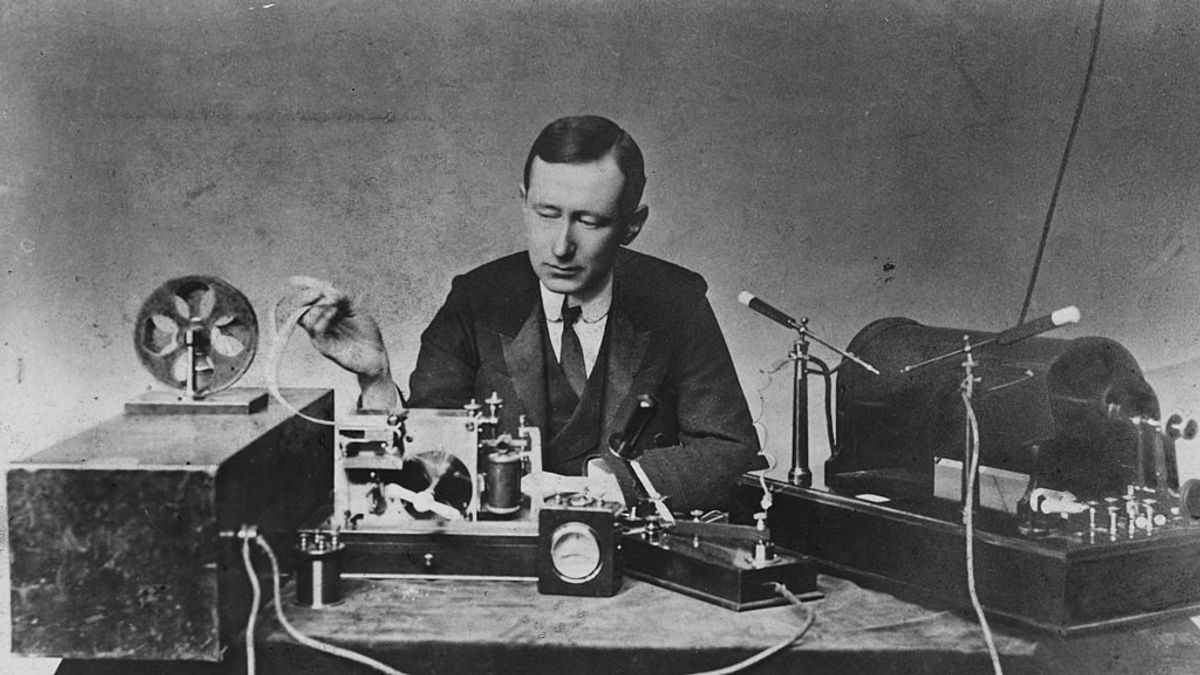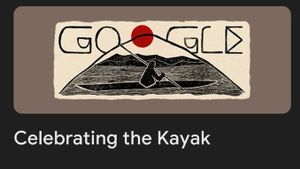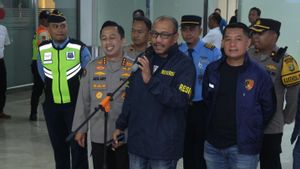JAKARTA - On December 12, 1901, Italian physicist Guglielmo Marconi and his assistant, George Kemp, heard a faint Morse code click for the letter "s" being sent wirelessly across the Atlantic Ocean.
This achievement was the first reception of a transatlantic radio signal, bringing considerable advances in both science and technology. It also shows that radio transmission is not limited by horizons.
Marconi's success also counters critics who tell him the horizon will limit transmission to 200 miles or less. The message traveled more than 2,000 miles from Poldhu in Cornwall, England, to Newfoundland, Canada.
Citing History, Saturday 12 December, Marconi was born in Bologna, Italy, in 1874. His father was Italian and his mother had Irish blood. Marconi studied physics and became interested in radio wave transmission after studying the experiments of the German physicist Heinrich Hertz. Marconi began his own experiments in Bologna starting in 1894 and managed to transmit radio signals within a distance of 1.5 miles.
Receiving a little encouragement for his experiments in Italy, Marconi left for England in 1896. He formed a wireless telegraph company and managed to transmit transmissions from a distance of more than 10 miles.
In 1899, he successfully delivered a transmission across the English Channel. That year, he also assisted two US ships to report to New York newspapers on the progress of the America's Cup yacht race. The successful effort generated widespread interest in Marconi and his wireless company.
Marconi's greatest achievement came on 12 December 1901, when he received a message sent from England at St. Petersburg. John's, Newfoundland. Transatlantic transmission made him famous all over the world. Ironically, the project's critics were right when they claimed that radio waves would not follow Earth's curvature, as Marconi believed.
In fact, Marconi's transatlantic radio signal travels into space when it bounces off the ionosphere and bounces back to Canada. There is still much to learn about the laws of radio waves and the role of the atmosphere in radio transmission. Marconi continued to play a leading role in radio invention and innovation for the next three decades.
In January 1902, the American Institute of Electrical Engineers held its annual dinner meeting to celebrate Marconi's invention. In attendance were figures in electrical engineering such as Alexander Graham Bell, Charles Proteus Steinmetz, and Michael Pupin.
Thomas Edison, who expressed his guilt at not being able to attend the dinner, described Marconi as "a young man who had the courage to try and succeed in jumping the electric waves across the Atlantic Ocean."
In 1909, Marconi shared the Nobel Prize for Physics with German physicist Karl F. Braun, the inventor of the cathode ray tube. Marconi's praise was not without controversy. Many other inventors have claimed the title "Father of Radio."
In early 1895, Russian physicist Alexander Popov conducted inter-building broadcasts, while in India Jagdish Chandra Bose used radio waves to ring a bell and set off an explosion.
In 1901 Serbian-American electricity pioneer Nikola Tesla said he had developed the wireless telegraph in 1893. Finally, in 1943, the US Supreme Court canceled four Marconi radio patents claiming they were the work of Tesla.
However, Marconi continues to make innovations and his services are clearly visible. Marconi diverted his energies to experimenting with shorter and stronger radio waves.
Marconi's company managed to end the isolation of sea travel and save hundreds of lives, including the passengers who survived the sinking of the Titanic.
When the Titanic hit an iceberg on April 14, 1912, Marconi's radio operator could be used to contact the Carpathia Ship to the scene to pick up 700 survivors.
Marconi died in 1937 and on the day of his funeral, all British Broadcasting Corporation (BBC) radio was silent for two minutes in tribute to Marconi's contribution to radio development.
The English, Chinese, Japanese, Arabic, and French versions are automatically generated by the AI. So there may still be inaccuracies in translating, please always see Indonesian as our main language. (system supported by DigitalSiber.id)










